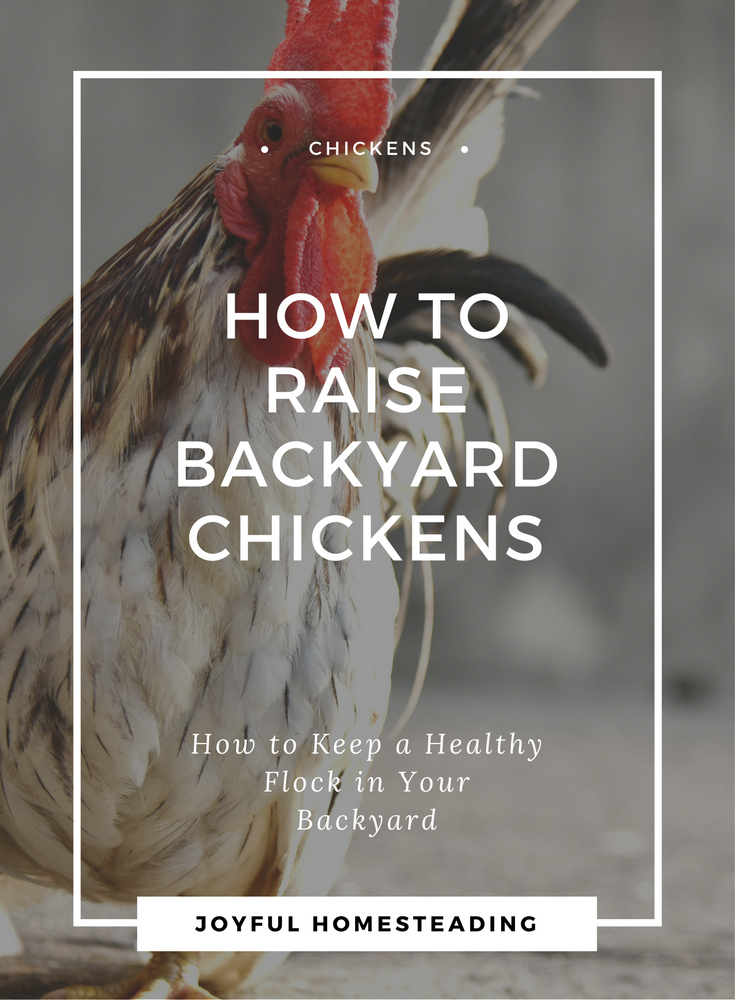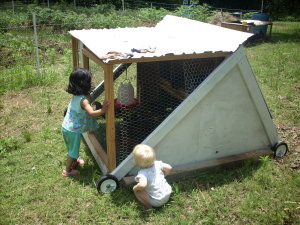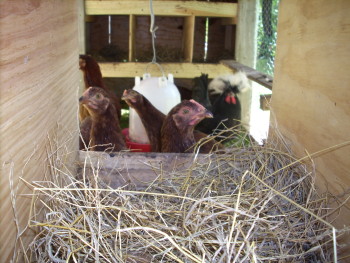Backyard Chickens
Backyard chickens are not as hard to take care of as other animals. Here's how to keep your backyard flock healthy and happy.

You should take care of your flock the same way you approach organic gardening - by strengthening them from the inside out with healthy food and a healthy environment.

Home Sweet Home Should
Be Home Safe Home
Whether you keep your backyard chickens in a stationary coop or a chicken tractor, you will need to protect your flock from the wind and sun. A roof is especially important for good maintenance.
Your backyard chickens will need shade during the hot summer days or they could go into early molt. Hens that go into molt will not lay eggs, so be sure to provide your birds with protection.
While their dwelling space should be well ventilated, there also should be some protection from wind. Your birds will appreciate a break from the north wind in winter. Your backyard chickens will need nests to encourage them to lay indoors. A good rule of thumb is one nest for every two birds.
Also, keep their waterers and feeders clean for good maintenance. The coop should be easy to clean as well. So while your backyard chickens might not need high ceilings, make them high enough so that you can get inside easily.
You will need to protect your flock from predators, especially dogs, who tend to love killing birds. A good solution is an electric fence surrounding your coop. Or you can use hardware cloth instead of chicken wire. Also, make certain the door to the coop can be latched shut to keep out unwanted guests.
Make certain your birds have adequate space. Provide three square feet per bird. Provide these simple maintenance precautions and you're on your way to a healthy flock.
You'll want your chickens to get the best diet possible for good maintenance, something that will be a challenge when your birds are confined. Of course, if you want your birds to get the best nutrition possible, keep them on grass in a chicken tractor.
That way they'll get a daily diet of fresh greens and insects. However, the greens usually won't be enough for a healthy maintenance, so you'll need to give your flock rations as well. To make sure they get their complete nutritional maintenance needs met, buy commercial rations for them.
Also, give your backyard flock an extra edge by feeding them sprouts on a daily basis. I find when I give my flock sprouts, they tend to produce more eggs.

You can find rations at any farm supply store.
The type of ration you buy will depend on the age of your flock and whether you are raising layers or broilers (meat).
Most farm supply stores will sell chick ration (for the first ten weeks of your flock's life);
broiler ration (both grower and finisher); pullet ration, both grower and developer for your female birds;
lay ration for your laying hens and scratch grains, a bit like candy to your flock.
Free-choice feeding - where you leave rations out all the time - is a simple way to make sure your flock is getting enough to eat. A large tube feeder is easier to use; you only have to fill it once a day.
Protect Your Backyard Chickens
By Keeping Things Clean
If you keep your chickens in a coop, the end result will start piling up and getting higher by the day! It's not healthy for anyone to live in their own manure, and your backyard chickens are no exception. So remove that manure on a regular basis, and add it to your compost pile. They'll appreciate the maintenance. Also scrub their waterers once a week and clean their feeders.
Avoid Visitors of the Feathered Kind
A couple of years ago, I was given a few chicks a friend had gotten for free. It turned out those chicks had virtually every parasite imaginable. I am so glad I kept them separate from the rest of my flock.
Other birds can bring diseases to your flock. Even if these birds look healthy, they may not be. If you get a new bird from somewhere, isolate her for two weeks to make sure she is healthy. Also, keep other poultry lovers away from your flock. They could spread diseases with their shoes.
Don't mix birds of different ages or species as they could spread disease as well. And finally, keep wild birds away from your backyard chickens. They can bring in parasites, along with the dreaded avian flu.
Just Stay Calm Everyone
Spend any time at all with chickens, and you'll realize they tend to panic easily. Today, one of our roosters got out of his pen and got chased by our dogs. He was so terrified he fainted dead away! Hence, the term "chicken-hearted." It won't take much to stress out your birds.
But stress is not good for anyone, and especially not for your flock. To keep things calm, talk gently or sing to your hens and roosters whenever you get near, and always handle your birds gently.
Build Your Own Chicken Tractor - Learn How







New! Comments
Have your say about what you just read! Leave me a comment in the box below.